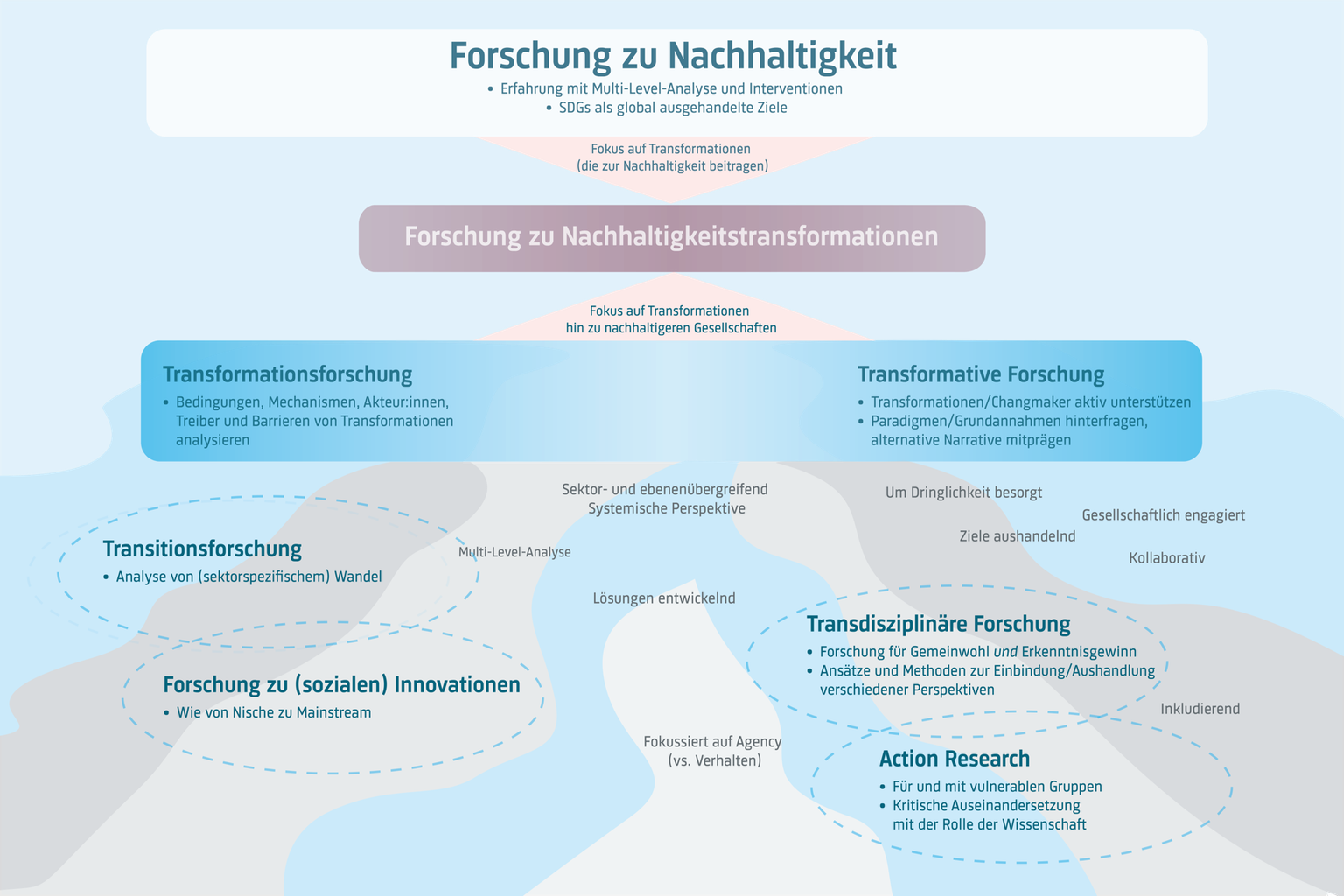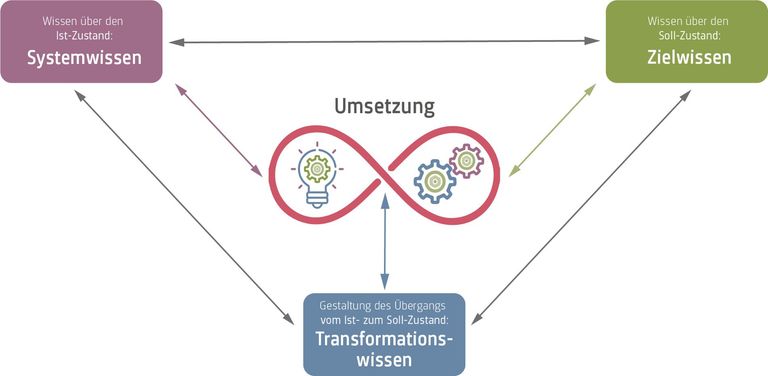What other approaches support research on sustainability transformations?
Literature and a survey of Swiss researchers indicate that sustainability transformations can be usefully studied, in particular, with the approaches of sustainability science, transdisciplinary research, action research, and innovation research.
Sustainability research
Sustainability research can be conducted in a mono-, multi-, inter-, or transdisciplinary manner and comprises both basic and applied research. It generates robust knowledge of socio-ecological systems at the local to the global scale, including of the impacts of human actions. In so doing, it often addresses issues of intergenerational equity. Thanks to the UN Sustainable Development Goals, sustainability research can work with internationally negotiated goals (target knowledge).
We view transformation research and transformative research – which both focus on changes in the direction of sustainability – as belonging to a diverse and broad body of research on sustainability. For example, sustainability research also encompasses basic technical research on issues such as energy efficiency or recyclable materials, which often does not focus on processes of societal transformation.
Reading tip:
Messerli, P., Kim, E. M., Lutz, W., Moatti, J. P., Richardson, K., Saidam, M., Smith, D., Eloundou-Enyegue, P., Foli, E., Glassman, A., Licona, G. H., Murniningtyas, E., Staniškis, J. K., van Ypersele, J. P., & Furman, E. (2019). Expansion of sustainability science needed for the SDGs. Nature Sustainability 2019 2:10, 2(10), 892–894.
https://doi.org/10.1038/s41893-019-0394-z
Accessing the research community at the Academies:
Steering Committee Sustainability Research (SRI)
Transdisciplinary research
Transdisciplinary research combines methods and ontologies from different disciplines and incorporates knowledge, experiences, and perspectives from diverse actors into the research. In this way, the problem investigated is jointly framed in discussion with others and research questions are collaboratively formulated. In addition, different perspectives and competencies are included in the actual analysis of the problem. Besides striving to generate systems knowledge, many transdisciplinary researchers seek to generate target knowledge and transformation knowledge as well as to collaborate with important stakeholders (beyond scientific circles).
Transdisciplinary research and transformative research share the goal of incorporating different perspectives in a structured manner (and developing methods for this) and generating different types of knowledge in order to address societal challenges. While transformative research usually includes transdisciplinary elements, transformation research also encompasses studies – e.g. historical analyses of transformation processes – that work fine well without transdisciplinarity.
Reading tips:
Network for Transdisciplinary Research (td-net): What is transdisciplinarity?
https://transdisciplinarity.ch/en/transdisziplinaritat/was-ist-td/
Schneidewind, U., Singer-Brodowski, M., & Augenstein, K. (2016). Transformative Science for Sustainability Transitions. In H. G. Brauch, Ú. Oswald Spring, J. Grin, & J. Scheffran (Eds.), Handbook on Sustainability Transition and Sustainable Peace (pp. 123–136). Springer International Publishing.
https://doi.org/10.1007/978-3-319-43884-9_5
Stauffacher, Michael (2020). Wege zu einer nachhaltigen Gesellschaft. ProClim Flash 72.
Accessing the research community at the Academies:
Action research
Action research has a long tradition and was already practiced before concepts such as sustainability and societal transformation emerged. One key emphasis is on methods that help to reduce or at least call attention to power asymmetries. Action research seeks not only to identify problems, but also to develop solutions in collaboration with various societal actors. Marginalized groups are often engaged. Action research criticizes positivist social sciences and their supposed value-free knowledge production, in addition to critically reflecting on the role of scientists and how they position themselves.
Action research and transformative research both address the positionality of researchers and the inclusion of “unheard voices.” Both strive not only to conduct analyses, but also to develop solutions. In this way, there is a significant overlap between action research and transformative research, though action research does not focus exclusively on transformation, but also, for example, on pedagogy and didactics. The overlap of action research with transformation research is smaller, as the latter mainly describes and analyses context and is less focused on identifying solutions.
Reading tip:
Bradbury, H., Allen, W., Apgar, J. M., Babüroğlu, O. N., Bishop, K., Etmanski, C., Leahy, M. J., Lifvergren, S., Nicolaides, A., Pór, G., Smith, S., Teehankee, B., Uldall, B., Waddell, S., & Zandee, D. (2017). Cooking with Action Research: Stories and Resources for Self and Community Transformation. AR+ Action Research.
Listening tip:
The Action Research Podcast (2020): What is Action Research? Episodes 1–3.
Research on (social) innovations
Innovation research examines, among other things, how an idea gains a foothold (niche) and becomes a guiding principle for action (mainstream) within society. In addition to technological innovations, social innovations are especially relevant for societal transformation processes. Research on social innovations examines the emergence and spread of new social practices that call into question and positively influence prior processes, resource uses, and behaviours. Social innovations thus aim to improve the welfare and well-being of specific communities or individuals.
More recent approaches inspired by the concept of social innovation examine the “Seeds of Good Anthropocenes” and “Exnovationen” in the context of transformations.
One area of overlap between transformation research and innovation research arises from the fact that innovations are considered drivers of transformation.
In addition to the strand of innovation research that develops theories of innovation, research on social innovators (start-ups, social enterprises, NGOs) often examines practical implementation. Here we posit an area of overlap between transformative research on changemakers and research on social innovators, which is worth exploring further.
Reading tips:
Bornemann, B., Bergman, M., Ejderyan, O., Fritz, L., Kläy, A., & Wäger, P. (2022). Innovations for the sustainability transformation: Conceptual cornerstones of the saguf working group INSIST. GAIA - Ecological Perspectives for Science and Society, 31(3), 182–184.
https://doi.org/10.14512/gaia.31.3.10
Moore, M.-L., Riddell, D., & Vocisano, D. (2015). Scaling Out, Scaling Up, Scaling Deep: Strategies of Non-profits in Advancing Systemic Social Innovation. Journal of Corporate Citizenship, 58.
www.jstor.org/stable/jcorpciti.58.67
Howaldt, J., & Schwarz, M. (2017). Die Mechanismen transformativen Wandels erfassen: Plädoyer für ein praxistheoretisches Konzept sozialer Innovationen. GAIA - Ecological Perspectives for Science and Society, 26(3), 239–244.
https://doi.org/10.14512/gaia.26.3.6
Franz, H.-W. (Hrsg. ), Beck, G. (Hrsg. ), Compagna, D. (Hrsg. ), Dürr, D. (Hrsg. ), Gera,(Hrsg. ), & Wegner, M. (Hrsg. ). (2020). Nachhaltig Leben und Wirtschaften. Management Sozialer Innovationen als Gestaltung gesellschaftlicher Transformation. VS Verlag für Sozialwissenschaften.
Pereira, L. (2021) Imagining Better Futures Using the Seeds Approach. Social Innovations Journal, 5,
https://socialinnovationsjournal.com/index.php/sij/article/view/694
Accessing the research community at the Academies:
The working group Innovation for Sustainability Transformation of the Swiss Academic Society for Environmental Research and Ecology (saguf)
Clarification d’autres termes



